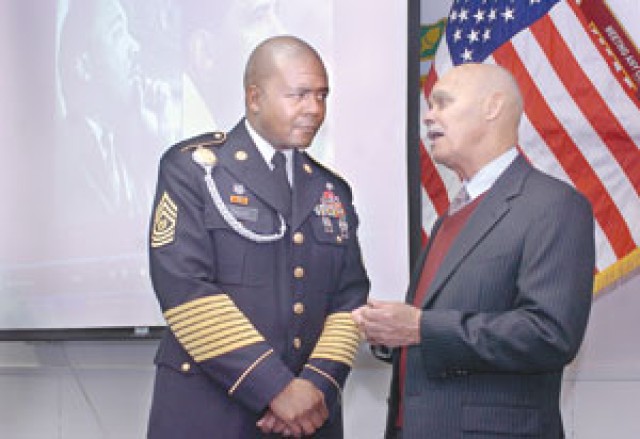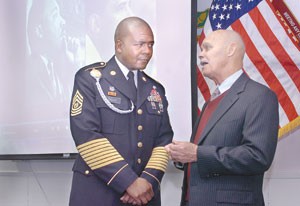
I am one of the last of the real Buffalo Soldiers," said Howard Maxwell. A roar of applause filled the room. The audience became quiet and Maxwell said, "I'm not anybody's hero, I just served and did my job."
The Equal Opportunity Program at Fort Belvoir sponsored a Martin Luther King Jr. Birthday Holiday Observance at DeWitt Hospital Friday. Maxwell was a guest speaker at the event.
The grandson of a slave, Maxwell enlisted in the Army at age 18 and was trained as one of the last real Buffalo Soldiers. In 1943, he served as a horse-mounted cavalry Soldier with the 9th Cavalry Regiment, which was formed in 1867. It was composed of former slaves who fought with the Union Army in the Civil War.
Maxwell is a retired social worker and Director of a mental health clinic specializing in substance abuse in Washington D.C.
Maxwell was born in Washington, D.C., and described what it was like to live in the city at the time. "A white person could not sell property to blacks in Washington. Blacks had no political clout at all at that time. All public accommodations were segregated. We did have access to public buildings such as the Smithsonian and Library of Congress, but shops and stores were not available to us.
"Few jobs were open to blacks in the government- the Post Office, Printing Office, and the Engraving Office were a few. Even if you got hired, blacks could not rise above a GS-4; we were not allowed to hold supervisor positions. There were a few black police officers at the time but they couldn't arrest white men; they could only detain them until a white officer arrived," Maxwell said.
When the Pearl Harbor bombing occurred in 1941, Maxwell was working at the post office and attending school. "I realized I was close to getting drafted, so I decided I would go in and volunteer for the military," Maxwell said. During Maxwell's story the entire room was silent and leaned forward in their chairs hanging on his every word.
"I wanted to be a flyer, but, during the physical they determined my vision was not good enough, so the Army it was. They were beginning to set up an all-black cavalry. My recruiter suggested I sign up with them. I said, 'horses'' I didn't know the Army even had horses anymore. So, I signed up and they sent me to Fort Clark, Texas. Fort Clark up until that point had always been composed of whites and Mexicans."
Maxwell experienced discrimination and isolation in the segregated Army of 1942, but went on to serve in North Africa, in Italy with the 370th Regiment of the famous 92nd "Buffalo Soldier Division" and in the occupying forces of Japan.
"Despite all the segregation, we were optimistic and patriotic; we knew it would get better. I'm not a color or race I'm an American. The Army was the best thing. It made a man of me," said Maxwell. During his time in the Army, very few African Americans were promoted to leadership roles. Despite his education and being a good Soldier, Maxwell was never promoted above corporal.
Maxwell said he decided he wouldn't let it get him down, he would continue to be the best Soldier he could.
After Maxwell's story, Command Sgt. Maj. James Diggs, North Atlantic Regional Medical Command, stood at the lectern for the presentation of gifts. "Colonel Callahan has brought to my attention what a patriot Mr. Maxwell is. It is individuals like Mr. Maxwell, whose shoulders we stand on, regardless of our race or affiliation."
"They said that was, in fact, the greatest generation, they did not say the greatest generation based on race or ethnicity. These are warriors who have paved the way," said Diggs. Maxwell was invited back for a future ceremony to, "recognize him as an honorary lieutenant." The room jumped to their feet giving Maxwell a standing ovation.
After his presentation, Maxwell said, "Martin Luther King's words are still very relevant today, the tactics aren't relevant, marches and demonstrations are not needed. What we need is more involvement, mentoring and tutoring."
Maxwell stated, "There are so many things that chipped at discrimination in this country, the right to vote, breaking down the real estate covenant, civil rights movement, the south constructed so many barriers to voting. All of those little things chipped away. We need mentors and leaders to show all the youngsters we are equals and they have so many opportunities."'

Social Sharing